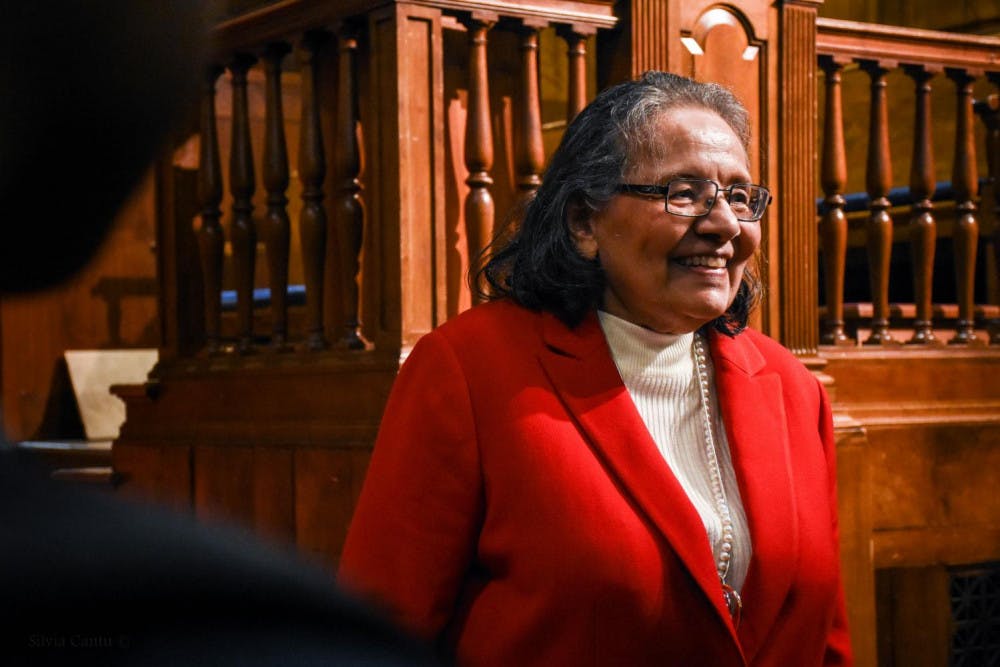Diane Nash, a pioneer of the civil rights movement, urged students and community members to carry the lessons from the movement and its activists into the future in an address in Mead Chapel on Monday. Nash called on the audience to take our future into our own hands.
Diane Nash played a significant role in the civil rights movement throughout the 1960s as one of the founding members of the Student Nonviolent Coordination Committee and an organizer of the 1961 freedom ride from Birmingham, Alabama to Jackson, Mississippi. She also worked with peace movements that promoted the end of the Vietnam War.
Nash became involved in the civil rights movement as a student at Fisk University in Nashville in 1959 and was taken aback by the overt racial segregation she observed. While segregation was present where she grew up on the South Side of Chicago, Nash said it was far more obscure than what she was exposed to in the South.
Nash described the segregation she experienced as a black woman in Nashville as “degrading and humiliating.” She began to look around her campus for organizations that were combating this discrimination but was questioned by other students, who warned her that she would fail and would get in trouble. That was until she found Reverend James Lawson, a student of Gandhi’s nonviolence who conducted weekly workshops.
Nash prefaced her talk by explaining her distaste for the terms used around the civil rights movement. The movement is often described as “nonviolent, ” and while this might be accurate to an extent, Nash does not feel like it is the appropriate word, because it only communicates a very small portion of the work they did during the civil rights movement.
Alternatively, Nash spoke to the ideas that she viewed as most influential to the movement and her own principles as an activist, many of which derived from Ghandi. He “developed a way that thousands and thousands of people . . . can focus and exert their love energy on an opponent . . . in order to bring about desired social change,” she said, rather than choosing to use violence.
From this idea of love as energy, Nash introduced the word agape, which connotes love among humankind. She then presented the term agapic energy, which she used to describe the work that was done during the civil rights movement. An agapic energy campaign or project has six steps: investigation, education, negotiation, resistance and taking steps to ensure that the problem does not reoccur.
Using agapic energy, Nash and her fellow activists successfully desegregated restaurants in Nashville. When discussing this process, she explained the importance of targeting ideas, not people. She said that if you use violence and attack people rather than political and economic systems or unjust attitudes, “you kill individuals but leave the oppressive system untouched.”
Nash also expressed her opinion that “oppression is a partnership,” stating that in all unjust relationships, the oppressed must consent to their oppression. Without such consent, “the system will fall.” Nash argued that while most people assume that activism focuses on changing other people, it really should focus on controlling oneself. If a person refuses to conform to an oppressive system, then the system will shift to accommodate that person. According to Nash, black Americans during the civil rights movement “changed [themselves] into people who could not be segregated.”
Tuesday marked the 50th anniversary of Martin Luther King Jr.’s assassination. While Nash has enormous respect for King’s work and is one of the few people who can say she has double dated with him, she said that she believes the depiction of King as the leader of the civil rights movement is harmful. She expressed that “it was not Martin Luther King’s movement, it was the people’s movement.”
Nash said that though people look to leaders like King when they see problems today, the civil rights movement was the result of everyday citizens standing up and refusing oppression in their societies. She urged citizens not to rely on elected officials or any other individual leaders, saying, “there is no one to solve problems but you and me.”
Nash ended her talk with a call to action.
“I am frightened for our country, I think it is time to get scared,” she stated. Citizens must take the future of the country and the fate of oppressed people around the world into their own hands, just as Nash and her fellow activists did over half a century ago.
Diane Nash Talks Lessons of Civil Rights Movement

Comments



